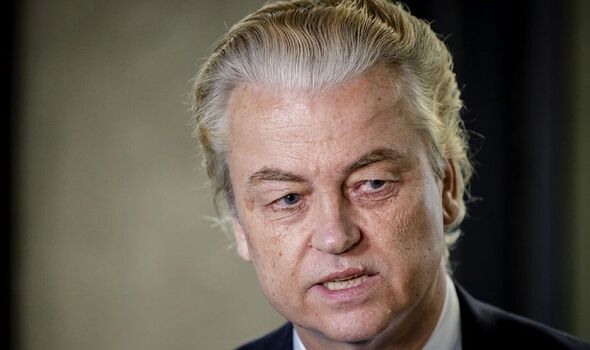The EU is facing a major confrontation with the Netherlands‘ new right wing government over immigration rules.
After six months of tortuous political negotiations, Geert Wilders has finally managed to cobble together a coalition.
The rightwing populist – a Euro-sceptic and leader of the far-Right party PVV – won a stunning victory at the polls last year that shocked Brussels and EU states.
The new government has vowed to take a much tougher stance on immigration and has applied to Brussels for an op-out on European asylum policy.
One of the proposals put forward by the new coalition is the right to “forcibly” deport those who are refused asylum “as much as possible”.
Wilders told reporters: “We will try to get a so-called opt-out for asylum, as the Danish have.
“That might take years if it is successful anyway.’
Denmark negotiated a deal to exclude the country from being bound by common EU asylum policies and the new Dutch government sees no reason why its request should be refused.
However an EU official raised the spectre of a major confrontation between Brussels and Wilders, saying there could be no exemption from existing treaties.
European Commission spokesman Eric Mayer said: “We will wait to see what a possible new Dutch government will formally propose.
“You cannot opt out of EU legislation… We are working on the basis of existing treaties and existing legislation.”
Wilders insisted that the new government would do everything in its power in the short term to limit the number of asylum seekers, promising a tough approach.
He said: “What we have today in our agreement is really the most tough anti-asylum (policy) ever being implemented in the Netherlands.”
Mr Wilders’ far-right PVV attracted a quarter of the national vote in last November’s election, after agreeing to bin some of his more extreme policies, such as banning the Quran, Islamic schools and mosques.
His victory sent shockwaves through Europe’s political establishment, following 14 years of broad-based coalitions led by VVD Prime Minister Mark Rutte.
But the four-party talks on forming a right-wing coalition collapsed in February, and by March Mr Wilders had abandoned his bid to become prime minister.
The man who brokered that first round of talks, Ronald Plasterk, 67, is now favourite to be offered the job of prime minister.
